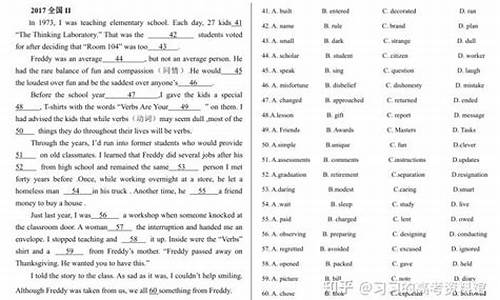您现在的位置是: 首页 > 教育比较 教育比较
2013年英语完型填空,2013高考英语完形填空
tamoadmin 2024-06-04 人已围观
简介1.英语完型填空常考词组2.高中英语完形填空必备蒙题技巧2010年Most people give little thought to the Pens they write with, especially since the printer. In modern homes and offices mean that very 36 things are handwritten.All t
1.英语完型填空常考词组
2.高中英语完形填空必备蒙题技巧

2010年
Most people give little thought to the Pens they write with, especially since the printer. In modern homes and offices mean that very 36 things are handwritten.All too often,people buy a pen based only on 37 ,and wonder why they are not satisfied 38 They begin to use it.However,buying a Pen that you'11 enjoy is not 39 if You keep the following in mind.
First of all.a pen should fit comfortably in your hand and be 40 to use.The thickness of the pen is the most important characteristic(特征) 4l comfort.Having a small hand and thick fingers,you may be comfortable with a thin pen. If you have a 42 hand and thicker fingers,you may 43 a fatter pen.The length of 8 pen call 44 influence comfort.A pen that is t00 45 can easily feel top-heavy and unstable.
Then,the writing point of the pen should 46 the ink to flow evenly(均匀地)while the pen remains in touch with the paper. 47 will make it possible for you to create a 48 line of writing. The point should also be sensitive enough to 49 ink from running when the pen is lifted.A point that does not block the 50 may leave drops of ink, 51 you pick the pen up and put it down again.
52,the pen should make a thick, dark line. Fine—line pens may 53 bad handwriting,but fine,delicate lines do not command 54 next to printed text,as, 55 ,a signature on a printed letter. A broad line ,on other hand,gives an impression of confidence and authority (权威).
36. A. many B. few C. pleasant D. important 37. A.1ooks B. reason C. value D. advantages 38. A. once B. if C. because D. though 39. A. convenient B. easy C. hard D. difficult 40. A. heavy B. easy C. hard D. safe
41. A. taking B. finding C. determining D. seeking
42. A. stronger B. weaker C. Smaller D.1arger
43. A. prefer B. recommend C. prepare D. demand
44. A. hardly B. allow C. never D. Still
45. A. thick B. 1ight C.1ong D. soft
46. A. change B. allow C. reduce D. press
47. A They B. One C. This D. Some
48. A thin B. rough C. black D. Smooth
49. A prevent B. free C. protect D. Remove
50. A way B. Sight C. flow D. Stream
51. A so B. as C. and D. Yet
52. A Meanwhile B. Generally C. Afterwards D. Finally
53. A show up B. differ from C. Break down D. compensate for
54. A attention B. support C. respect D. Admission
55. A at most B. For example C. in brief D. on purpose
2011年When I begin planning to move to Auckland to study, my mother was worried about a lack of jobs and cultural differences. Ignoring these ___36___, I got there in July 2010. __37__ I arrived, I realized the importance of getting a job __38__ my living experience. Determined to do this __39__ , I spent several weeks going door-to-door for a job, but found __40__ response(回应).
One afternoon, I walked into a building to ask __41__ there were my job opportunities(机会). The people there advised me not to continue my job search in that __42__. As I was about to __43__, a man who had been listening approached me and asked me to wait outside __44__. Nearly ten minutes later, he __45__. He asked me about my plans and encouraged me to stay __46__. Then he offered to take me to Royal Oak to __47__ a job.
I was a little surprised, but had a __48__ feeling about him. Along the way, I realized that I had __49__ resumes(简历). Seeing this, the man __50__ at his business partner’s office to make me fifteen __51__ copies. He also gave me some __52__ on dressing and speaking. I handed out my resumes and went home feeling very __53__. The following day, I received a __54__ from a store in Royal Oak offering me a job.
It seems that the world always __55__ to you when you need it. And this time, it was a complete stranger who turned out to be a real blessing.
36.A.doubts B.concerns C.instructions D.reasons
37.A.Even if B.Every time C.Now that D.Soon after
38.A.of B.at C.for D.with
39.A. on my own B.on my way C.by any chance D.by the day
40.A.any B.much C.some D.little
41.A.why B.wherever C.whether D.whenever
42.A.direction B.attitude C.language D.manner
43.A.answer B.work C.leave D.refuse
44.A.for ever B.at any time C.as usual D.for a while
45.A.returned B.hesitated C.passed D.regretted
46.A.silent B.busy C.positive D.comfortable
47.A. pick out B.search for C.take on D.give up
48.A.dull B.good C.guilty D.general
49.A.made use of B.taken care of C.run out of D.become tired of
50.A.stopped B.knocked C.glanced D.appeared
51.A.right B.more C.former D.different
52.A.pressures B.agreements C.impressions D.suggestions 53.A.lonely B.funny C.disappointed D.satisfied
54.A.call B.tip C.present D.report
55.A.turns off B.goes over C.gives back D.looks up
2012年
When I settled in Chicago,my new city seemed so big and unfriendly, Then I had a 36 problem and had to go to hospital for a 37 examination.
It seemed a small 38 compared to the one I was about to face ,but things started to go 39 right from the beginning , Not having a car or 40 the city, I was depending on a couple of buses to get me from A to B, 41 I’d left myself plenty of time, soon it was 42 I was going to be late, as I had mistakenly boarded a bus that was taking me in the 43 direction.
I 44 the bus and stood on the pavement not knowing what to do, I looked into the eyes of a 45 , who was trying to get past me, 46 , instead of moving on ,she stopped to ask if I was 47 , After I explained my 48 to her, she pointed to a bus stop across the street , where a bus would take me back into the city to my 49 . Sitting there waiting, I felt 50 that someone had been willing to help . 51 , hearing a horn (喇叭) nearby, I looked up to see a car with my new friend 52 at me to get in, She had returned to offer me a 53 to the hospital.
Such unexpected 54 from a passer-by was a lovely gift to receive. As I climbed out of the car at the hospital and turned to thank her, she smiled and told me not to lose 55 , for all things are possible.
36. A. physical B. traveling C. social D. housing
37. A. scientific B. final C.previousD. thorough
38A. chance B. challenge C. success D. error
39. A. wrong B. easy C. fast D. ahead
40. A. leaving B. visiting C. knowing D. appreciating
41. A. Although B. Since C. Unless D. Once
42. A. strange B. necessary C. obvious D. important
43. A. same B. right C. general D. opposite
44. A. looked at B. waited for C. got off D. ran into
45. A. driver B. friend C. stranger D. gentleman
46. A. Especially B. Surprisingly C. Probably D. Normally
47. A. nervous B. excited C. OK D. dangerous
48. A. idea B. motivation C. excuse D. situation
49. A. appointmentB. apartment C. direction D. station
50A. afraid B. grateful C. certain D. disappointed
51. A. Thus B. Then C. Perhaps D. Surely
52. A. staring B. laughing C. waving D. shouting
53. A. lift B. suggestion C. bike D. guidebook
54. A. results B. news C. kindness D. appearance
55. A. Power B. Faith C. Touch D.Support
2013年
If you want to learn a new language, the very first thing to think about is why. Do you need it for a ___36_____ reason, such as your job or your studies?___37____ perhaps you’re interested in the ___38____ ,films or music of a different country and you know how much it will help to have a ___39____ of the language.
Most people learn best using a variety of ___40____, but traditional classes are an ideal(理想的)start for many people. They ___41___ an environment where you can practice under the ___42___ of someone who’s good at the language. We all lead ___43___ lives and learning a language takes __44___. You will have more success if you study regularly, so try to develop a ___45___. It doesn’t matter if you haven’t got long. Becoming fluent in a language will take years, but learning to get by takes __46____.
Many people start learning a language and soon give up. “I’m too __47___,” they say. Yes, children do learn languages more __48___ than adults, but research has shown that you can learn a language at any ___49___. And learning is good for the health of your brain, too. I’ve also heard people ___50___ about the mistakes they make when ___51___. Well, relax and laugh about your mistakes __52____ you’re much less likely to make them again.
Learning a new language is never ___53___. But with some work and devotion, you’ll make progress. And you’ll be ___54____ by the positive reaction of some people when you say just a few words in ___55___ own language. Good luck!
36. A. technical B. political C. practical D. physical
37. A. After B. So C. Though D. Or
38.A literature B. transport C.agriculture D. medicine
39.A view B. knowledge C. form D. database
40.A paintings B. regulations C. methods D. computers
41.A. protect B. change C. respect D. provide
42.A. control B. command C. guidance D. pressure
43.A. busy B. happy C. simple D. normal
44.A. courage B. time C. energy D. place
45.A. theory B. business C. routine D. project
46.A. some risks B. a lot less C. some notes D. a lot more
47.A. old B. nervous C. weak D. tired
48.A. closely B. quickly C. privately D. quietly
49.A. age B. speed C. distance D. school
50.A. worry B. hesitate C. think D. quarrel
51.A. singing B. working C. bargaining D. learning
52.A. if B. and C. but D. before
53.A. tiresome B. hard C. interesting D. easy
54.A. blamed B. amazed C. interrupted D. informed
55.A. their B. his C. our D. your
英语完型填空常考词组
高考英语完形填空60组高频动词汇总(doc文档)百度网盘 ?
链接: 提取码: s2sg
若资源有问题欢迎追问~
高中英语完形填空必备蒙题技巧
1.以break为中心的词组
break away from 脱离,逃离 break down 破坏,粉碎;瓦解;出故障,抛锚 break in 闯进,打断;使顺服 break into 闯入;强行进入;突然开始
break out 爆发,发生;准备使用;起锚 break the law 违反法律
break the record 破记录 break one’s promise 失言
break up 开垦,破碎;解散,分开,分解
2.以catch为中心的词组
be caught doing 被发现做某事 be caught in the rain 淋雨
catch a bus/train 赶汽车/火车 catch a cold 伤风,感冒
catch one’s word 听懂某人的话 catch sight of 发现,瞥见
catch up with 赶上,追及,追上
3.以come为中心的词组
come across 偶尔发现,想起;越过;偿付 come along 一道来,陪伴;进步,进展;出现 come at 达到,求得,得到;扑向,袭击 come back 回来;恢复,复原 come down 倒下;降落;跌落;病倒 come from 来自,起源于,从~~产生,生于 come in 进来,进入;流行起来;获名次 come into being 发生,产生,出现,形成 come into power 开始执政,当权,当选 come into use 开始使用,获得应用 come on 上演;开始;赶快;发展;(问题)被提出;登台 come to know 开始了解到 come out 出来,传出;出版;结果是;褪色;(秘密)泄露 come to 苏醒,复原;共计;达到;归结于 come to an end 终止,结束 come true 实现,成为现实;证实 come up 走近;上楼;长出,发芽
4.以do为中心的词组
be done in 精疲力竭 be done with 完全结束 do a good deed 做一件好事 do away with 去掉,废除;弄死;浪费 do good to (=do sb. good) 有益于 do harm to (=do sb. good) 有害于 do its work 有效,有作用 do much 极有用
do wrong to 做错 do one’s best 尽某人最大努力 do one’s homework 做作业 do one’s utmost 尽力而为 do proud 足以使~~骄傲 do sb. justice 公平对待某人 do some cleaning (V+ing,etc.) 搞卫生 do sb. a favor 帮助某人
do well in 学得不错,干得漂亮 do with 和~~相处,忍受,处理 do without 不需要,不用 do wonders 创造奇迹 have much to do with 和~~很有关系 have nothing to do with 与~~无关 have something to do with 和~~有关
in doing so=in so doing 这时,在这种情况下 That will do. 行了;够了
5.以get为中心的词组
get about 徘徊,走动,旅行;流传 get above oneself 自视高傲 get accustomed to 习惯于,对~~习以为常 get across 度过,通过,横过;说服,使理解 get ahead of 胜过,超过 get along 前进,进步;同意;离去
get along with 与~~相处 get at 发现,了解;掌握;攻击 have got to do 不得不,必须 get away 离开,逃脱 get back 取回,回来;报复 get behind 落后;识破 get down 咽下;写下;使沮丧,使抑郁 get down to 认真对待,静下心来
get familiar with 熟悉 get hold of 获得,取得 get home 到家 get in 进入,陷入;牵涉 get off 送走;脱下(衣服);下车;动身 get on 上车;穿上;进步,使前进;成功;相处 get upon with 进步;在~~方面获得成功 get one’s hand in 熟悉;习惯 get out of 由~~出来,从~~得出;避免;退休
get over 越过;恢复,痊愈;克服;完成 get ready for 为~~作准备 get rid of 除去,去掉;免除,摆脱 get through 到达,完成,通过;及格 get together 积聚,积累;商谈,取得一致意见 get up 起床,起立;研究,钻研;致力于;安排,组织 get used to 习惯于
6.以give为中心的词组
be given to 沉溺于,癖好 give about 分配;传播 give and take 相互迁就 give away 赠送;牺牲;泄露;颁发 give back 归还 give cause 给予~~的理由 give ear to 侧耳倾听 give forth 发出,放出;发表 give in 屈服,让步,投降
give in to 同意,接受;向~~让步 give off 发出(烟,气味) give oneself out to be/as 自称为 give oneself up to 专心于;向~~自首 give out 分发,公布 give place to 让位于,被~~所替代 give rise to 引起,导致;使~~发生 give sb. to understand 通知某人 give up 放弃;停止 give way to 让步,退却;屈服于
7.以look为中心的词组
look about 四下环顾;查看 look after 照顾,看管 look around 东张西望 look at 注视,着眼于 look back 回顾 look for 寻找;期待,期望 look down on 俯视;轻视 look forward to 盼望,期待 look into 窥视;调查;浏览
look like 看起来象 look on 旁观;面向 look out 向外看;注意;当心,堤防 look over 从上面看过去;检查 look through 透过~~看去;看穿;浏览 look up to 仰望,尊敬
8.以make为中心的词组
be made from 由~~原料制成 be made of 由~~材料制成 be made up of 由~~组成 make a fool of 愚弄,欺骗 make a mistake 弄错 make a point of doing 强调;认为~~重要;决心,坚持 make advantages/use of 使用,利用
make after 追求,追赶 make believe 假装 make certain 确信,把~~弄清楚 make contact with 接通,与~~接触,与~~联系 make for 去向,向~~前进;有利于 make friends with 和~~交友 make into 把~~制成,使~~转变为
make much of 重视;理解;赏识 make one’s mind on sth. 决定某事 make one’s own 当作自己的看待 make oneself at home 随便,别拘束 make out 填写;开支票;理解;辨认 make the best of 尽量利用;极为重视
make up 弥补,修理;赔偿,补偿;起草;编造;化装 make up to 接近,巴结;向~~求爱 make way for 为~~让路,让路于 on the make 急求成功;增加
9.以put为中心的词组
put aside 把~~放在一边;搁置;排除 put away 把~~放好,把~~收拾;储藏;吃喝,吃掉 put back 把~~放回原处;驳回 put down 放下;镇压;制止;记下;削减;降落 put forward 提出;拨快;建议,推荐;提倡,倡议
put ~~ into 把~~放入;插入;翻译成 put off 推迟,延期;消除;推脱,推辞 put on 上演;穿上,带上 put up with 忍受,容忍 put one’s heart into 全神贯注,专心致志 put up 举起,挂起;提名,推荐;陈列
10.以take为中心的词组
be taken aback 吃惊 take a seat 就坐 take a shower 淋浴,洗澡 take aim 瞄准,设立目标 take away 拿走,减去;夺去 take ~~ by surprise 出奇制胜 take one’s place 就坐,入坐 take care of 当心,注意;照顾;提防;谨慎;处理,对付;负责 take office 就职,上任 take ~~ for 把~当作 take off 脱去,除去;离开;起飞;模仿;起程;致死;复制,作副本;减弱 take one’s temperature 量体温 take part in 参与,参加 take it easy 别着急,慢慢来 take place = happen 发生,举行 take the place of 代替 take pride in 以~~为荣,对~~骄傲 take sb. by the arm 拉某人的胳膊
11.以turn为中心的词组
give a new turn to 对~~予以新的看法 in one’s turn 轮到某人做某事 out of turn 不按次序的,不合适宜的 take one’s turn to do 轮到做 turn a blind eye to 对~~视而不见 turn against 背叛,采取敌对态度
turn back 折回,往回走 turn down 折叠,翻下,驳回,拒绝考虑 turn into 走进;变成,变为 turn to ~~for help 求助于 turn off 关上(自来水,电器开关);解雇,辞退;避开(问题);制造;生产 turn on 打开(自来水,电器开关);反对;依靠,依赖,取决于 turn one’s attention to 把注意力转向
turn out 培养;证明是;制成;实际情况是 turn out to be 原来是,证明是,结果是 turn over a new leaf 翻开新的一页,重新开始,改过自新 turn (a)round 旋转,转过身来;改变意见;采取新政策 turn to 变成;着手于 turn upside down 颠倒过来,翻过来;使陷入混乱
拓展相关: 如何提高英语完型填空能力
完型填空是一项综合性很强的题目。在平常练习中,大多数人都认为完型填空很难应付,其实,即使题目再难,答题也是有章可循的。为大家分享了提高英语完型填空能力方法,欢迎大家借鉴!
一、通览全文,抓准主旨
有的同学或是急于求成,总想"一步到位",或是由于原文设置空格所造成的理解障碍,担心通读文章时不但抓不住大意反而浪费时间,未通览全文即边读边填,结果是就句论句,无法形成连贯的思路,或“见木不见林”,理解偏离文章的中心,欲速则不达。
大家首先要克服不良心理,满怀信心,全神贯注,目光越过空格,注重把握文章的整体内容,注意能体现文章大意的关键词句。开始阅读时可能会有模模糊糊,类似“钻山洞”的感觉,此时千万不可半途而废;再往下读,文意会逐渐显露,读完全文心里往往会有"豁然开朗"之感。另外,要重视文章首句的作用,一般情况下,首句不设空格,这就为大家窥视文章全貌提供了一个“窗口”。通过文章的首句大家可以对文章进行比较准确的定位。
另外,大家要给文章准确定位,不仅要重视文章的首句,有时注意一下文章的结尾,首尾联系起来,对文章的定位会更准确。抓住文章的主旨大意后,考生围绕主旨大意去阅读、预测、推理、判断,往往会收到事半功倍的效果。抓住了主旨,一些干扰性强,容易使人犯想当然错误的选项也就起不到作用了。
二、细读全文,透析文意
有的考生在做完形填空题时,一看到一些自己比较熟悉的语法结构,如句子、短语等,便不假思索地去选,对特定的语境不去作深入的理解,导致“定势思维”错误。
事实上,从高考英语完形填空的出题特点看,其干扰项的设置均与“语法结构”错误无关,重在文意的干扰,这是出题者近几年始终坚持的方向。高考英语完形填空每个题的四个选项并不是一种单纯的词汇辨析,因为从语法的角度看每个选项都是正确的。因此是否能恰如其分地传达文意才是选择正确答案或最佳答案的唯一标准,要吃透文意,理解到位,大家应做到以下几点:
1. 注意上下文的内在联系 断章取义,就题论题,忽视上下文的信息提示是学生常犯的错误。考生在做完形填空的过程中,应学会边读边在大脑中储藏上下文的信息。信息提示有时出现在前面,有时出现在后面。如:
Eating spaghetti (意大利面条) caught my eye. The word "spaghetti" brought back the _36_ of an evening at Uncle Alien's in Belleville (when) _37_ all of us were seated around the table and Aunt Pat (served) _38_ spaghetti for supper.(2004全国卷I)
36. A. memory B. thought C. knowledge D. experience
本题的信息提示出现在前面。做题的关键在于把握brought back与后面名词的搭配关系,即动词短语决定了名词的选择。bring back“把……带回来”,因此此处只能是“把过去的记忆带回来”,即“使人回忆起……”,因此答案只能是A。
With these words I began to (face) _36_ the problem, the problem of my telephone addiction. I used to call people _37_ , from the moment I woke up to the time I went to sleep. I (waited) _38_ to be phoned, I wanted to phone. Just one more call.(2004全国卷Ⅱ)
37. A. now and then B. all the time C. at home D. at work
本题的信息提示出现在后面。空后的.“从早晨醒来到上床睡觉”说明前面的动作是“经常、不断的”,因此答案只能是B。
2. 注意英汉两种语言的差异,不能简单地互译
出题者深知学生在英语学习过程中的弱点,往往从母语的角度设置干扰项来增加试题难度,考查学生的基本功和灵活运用能力,所以在平常的学习中,要逐渐培养自己的"语感",不要受母语的影响。
It started socially — a few calls each day. It seemed (fine) _39_ , just a quick chat. Gradually though, the (situation) _40_ got worse. Soon it was _41_ use, until, finally, addiction. (2004全国卷Ⅱ)
41. A. frequent B. regular C. unusual D. particular
本题如果仅凭汉语思维"经常用"电话,很容易误选B, regular虽然也有"经常的"的意思,但侧重指"固定的,有规律的",不是一个贬义词。因此此处表示最后作者打电话上瘾之前,打电话是一种"频繁的"行为,含有贬义,因此用"频繁的",表示行为"过火",答案为A。
3. 研读细节,准确认定语境
用学生平日常见的固定搭配来干扰学生对具体语境的认定,利用定势思维来增强试题的诱惑性。如:
I was phoning people and (leaving) _46_ messages to make sure _47_ calls would see me through the day. (2004全国卷Ⅱ)
47. A. long B. immediate C. enough D. surprising
本题仅看前面和后面介词短语的搭配,很容易误选A。但仔细推敲语境,此处并不表示电话的"长度",而表示电话的"数量",因此应选C。
4. 发挥逻辑思维能力,挖掘文章寓意、隐意
近几年NMET完形填空以叙事为主,有时加入一定的议论和说明,内容贴近生活,表层意思易于理解,所以很容易给学生造成一种"假象",产生“轻敌”心理,有些同学做完一篇完形填空以后,自我感觉不错,但一对答案错很多,原因是这些同学仅仅理解了文章的表层含义,而忽略了其深层含义。事实上,高卡英语完形填空文章大都包含一定的哲理、寓意,具备深层探询的可能性。这就要求考生不仅要明确文章的表层意义,还要挖掘出文章的深层含义,做到“表里一致”。如:
52. laughed, then the whole class was laughing with open hearted enjoyment. I did my best not to show (pleasure) _53_ , but what I was feeling was pure happiness.
A. People B. Nobody C. Somebody D. I
本题要求根据事情发展的逻辑关系来判定答案。答案是C,此处叙述作者的作文给全班同学带来欢乐的过程,先是“有人”发笑,最后全班同学大笑,逻辑通顺。
5. 结合生活常识判断
At first, everyone on the team got _38_ playing time. Then the team moved up to the top division after winning all its games, and the _39_ started. Some parents, who had paid the coach extra so their daughters could have _40_ one-on-one training, got angry when she didn’t give them more playing time in our _41_ . The coach was replaced. (2004北京高考)
38. A. great B. equal C. right D. extra
39. A. business B. struggle C. attempt D. pressure
40. A. free B. private C. good D. basic
41. A. matches B. courses C. lessons D. programs
本文介绍作者(一个少年女子足球队员)踢足球的经历。一开始,我们得到“平等的(38)”踢球时间;然后当我们的队获得联赛冠军以后,怎样呢?结合生活常识判断,应是有了"压力(39)"。后面父母贿赂教练干什么呢?根据生活常识判断,应该是让自己的孩子得到“开小灶”的机会,因此40应选B, private“私人的”。41,父母生气是因为贿赂没有起作用,也就是在我们的“比赛”中,他们的女儿没有得到更多的上场比赛的时间。
三、全面验证,理清逻辑
高考英语完形填空所选文章都堪称精品,其逻辑必是上下贯通,其脉络也必是自然有序,令人信服。因此,做完一篇完形填空以后,大家对文章的线索、脉络以及主旨、寓意等心里也应该有一种很"明朗"的感觉;如果做完以后,还是似懂非懂,犹如"雾里看花",那就证明你对文章的把握还有问题,还要复读全文,验证答案。大家可以从文章的内在逻辑入手,回味一下,看所选答案是否经得起推敲,是否能自然融入整个语篇,如果有游离于文章主旨之外或与整篇文章的逻辑相矛盾的答案,就需要重新理解、修正。有的同学做完完形填空以后,不加核查便草草"收场 ",结果让很明显的错误从眼前跳过,造成考场上不应有的"遗憾"。
英语完形填空是高考必考题型,但是很多同学在完形填空丢分严重,一来是因为本身词汇量少、语法知识没有掌握,二来是没有正确的做题方法。下面是我分享的高中英语完形填空蒙题技巧,一起来看看吧。
高中英语完形填空蒙题技巧
找关键词
①后面一定要接动词原形的单词有:
情态动词:can,would,could,must,may,should,need(在否定句和疑问句中)。
使役动词:make,let,have.
助动词:do,does,don?t,doesn?t,didn?t.
whynot=whydon?tyou.
②后面一定要接v-ing的有:
所有介词(to除外):about,for,in,on,by,at,with,of?etc.
一些单词:find(found),practice,finish,havefun,enjoy,mind,stand,like.
③一些既可接v-ing也可接todo不一式。
rember,forget,stop,注意后接todo(不定式)表示事情还没有做,接v-ing表示已经做了。
④后面一定要接todo(不定式)的有:
语篇标志的利用
语篇与语篇之间往往有表明其内在联系的词语,如:表示结果层次的语篇标志firstly,secondly,thirdly,finally等;表示逻辑关系的有thus,therefore,so等;表示改变话题的有bytheway等;表示时间关系的有before,sofar,yet,now,later等。如果能充分利用这些语篇标志语,就可以迅速理清文章的脉络,弄清上下文的关系。
利用语法分析解题
对语法、词法等基础知识的考查也是完形填空题的命题角度之一。对于这种题,要针对地对语法结构、句式特点、对短文中所设空格中需填的词在句子里作什么成份、哪类词适合、应采取什么形式等等进行必要的分析思考,从而迅速解决问题。比如,选用动词就要考虑各种时态、语态、语气、主谓搭配以及其如何与其他词类使用等一系列问题。
分析句子结构
名词从句选what,定语从句选where,状语从句when、before、while。
虚拟语气过去时间为主haddone或wouldhavedoneshould,would?选should或不填,bedone。
时态也先交集原则,然后有过去进行选,没就选一般过去或者have been doing动词短语也是交集,还是选不出来就选c
高中完形填空解题分类实例分析完型填空可以根据以下4种并列关系解答,授课过程中教师引导学生分析语篇中的相对关系,找出正确选项
1、因果关系
[例1]These tell the story of a mother whose baby grows 23 and pale and has changed so much that it is almost unrecognizable to the parents.
A. sick B. slim C. short D. small
[解析]选项中只有ill才与pale 有相关性(因果关系),即因为?生病?,所以脸色才会?苍白?,故选A。
2、同类关系
[例2]Edgar Allan Poe, whose life was short and seemingly unhappy, wrote stories and poems of mystery and 22insanity(疯狂) and death.
A.happiness B.science C.society D.terror
[解析]因为只有terror(恐怖)才与mystery(神秘)、insanity(疯狂)和death(死亡)是表示同类意义的名词,而不可能是与?happiness(幸福)?science(科学)?或?society(社会)?并列,故选D。
3、类属关系
[例3]Edgar Allan Poe is also remembered as the father of modern detective fiction, stories of an investigator who has to solve murders and other 27
A.accidents B.crimes C.events D.incidents
[解析]因为?murder(凶杀)?是各种?crimes(犯罪)?行为中的一种,所以与?murder(凶杀)?并列应是?其他各种犯罪行为?,故选B。
4、相对关系
[例4]When Christ was born nearly two thousand years ago, many people, rich and _______, gave him presents.
A.ill B.healthy C.poor D.tall
[解析]因为由句意可知,应当是指?耶稣出生时,许多人,无论贫富,都给他礼物?,故选择与rich相对意义的poor,即选C。
英语高考完形填空的做题技巧完形填空题是为了测试考生实际应用英语的能力和语感。
具体说来,是从语篇角度综合测试考生的阅读理解能力、词汇的掌握和对英语习惯用语的熟悉程度、以及语法规则的灵活运用。
做完形填空题是基于对整个语篇的理解,要求学生掌握相当数量的词汇、句型、词组和一定的阅读理解能力和词语搭配能力以及综合运用语言知识的能力,也是一种难度较大的阅读题型,是对考生阅读理解和语言综合运用能力的测试。
1、通读全文,抓住主题:
考生应该迅速地浏览全文,以了解全文主旨。掌握文章的主题,并留心文中的关键词,了解这篇短文说什么,发生的时间、地点、文章的目的、作者的观点与态度等,这对于做好完形填空题能起到事半功倍的效果。
应该精读第一句,它是了解全文大意的基石。完形填空题文章的第一句话通常是没有空白的完整句子,而且第一句往往是文章的主题句 (Topic Sentence),或是含有主题词的句子,考生可以根据它来把握文章的中心思想,为下面的答题奠定基础。
2、逐句分析,粗选答案:
在理解短文主旨和上下文语境的基础上,理解挖空句的句意,分析其结构,结合已有的语法知识,兼顾语法和意义,大胆猜测,各个击破。
切记:每空要填的单词都可以在所在句或上下文中找到它的依据。考生在没有通读全文、弄懂大意的情况下,就急忙边阅读边依空选择,是一种不良的答题习惯。而且那些错误的答案往往会在大脑中先入为主,在复查时很难发现。
考生在做题之前必须先集中精力快速阅读短文,掌握其大意,同时要记住短文里的人物、时间或地点,尤其要注意首句和尾句的含义。这样,答题时才能心中有数。此时可以边阅读边粗选答案,这是为了尽量减少空格,帮助更透彻地了解全文。
3、一定要保证通盘理解,前后一致:
完形填空所选的文章都是具有逻辑关系、意义相联的语篇,而词语的重复出现、同义词和反义词的使用是重要的连句成篇的词汇纽带,因此,在行文中不可避免地会出现词语的复现、前后同义词、反义词相互照应等现象。
所以,考生在答题时,不要急于求成而要充分利用上下文信息词,在继续阅读中寻找和斟酌答案。充分利用文章的上下文和前后句,找到对选择有提示作用的词或句。这些词有时可能是同义词或反义词。
有时如果从某一个单句来理解,四个选项都可以填入,但从整个语篇来看,答案只有一个。因此在做题目的时候,一定要对空格前后句子以及该空格相应的选项进行全面分析。
完形填空所要求填的答案在意义上必须和短文内容相符,形式上必须符合语法规则和习惯用法。考生不可顾此失彼,在选择答案时,应先从意义上判断其是否与短文内容相吻合,然后再从时态、语态、非谓语动词、主谓一致、固定搭配等形式上来判断所选答案是否恰当,前后参照,连贯考虑,提高选择的准确率。
做完形填空时,对于一时没有把握的题目,可以采用?迂回战术?,在题号前标上记号,先绕过去做下面的题目。在做完较容易的题目之后再回过头来思考那些难题,同时把已确定好了的答案代入短文,帮助理解。这样,也许难题就不难了。
因此,我们在做完形填空题时,千万不能读一句做一句,更不能看到就填,这样往往要出差错的。
4、最后还要再检查,复查核定:
题目做完以后,再将文章读一遍,把已经填好的答案放在整篇文章中来检查,看其语法是否正确,短文语意是否贯通。
检查自己对全文的理解是否准确,情节发展是否合理,全文前后上下是否符合逻辑,验证自己完形的答案是否能使全文贯通流畅,如果前后有矛盾或句子不通顺,证明有可能出现错误,这时候就要重新予以考虑。
此外,还要从语法上看句子是否主谓一致,特别要注意非谓语动词是否与主语一致,时态是否前后呼应,检查动宾搭配、动词、形容词、名词与介词的搭配是否合理,如果发现问题,则要根据文章的主题思想、本句、本段和全文的上下文与逻辑关系,重新选择选项。









